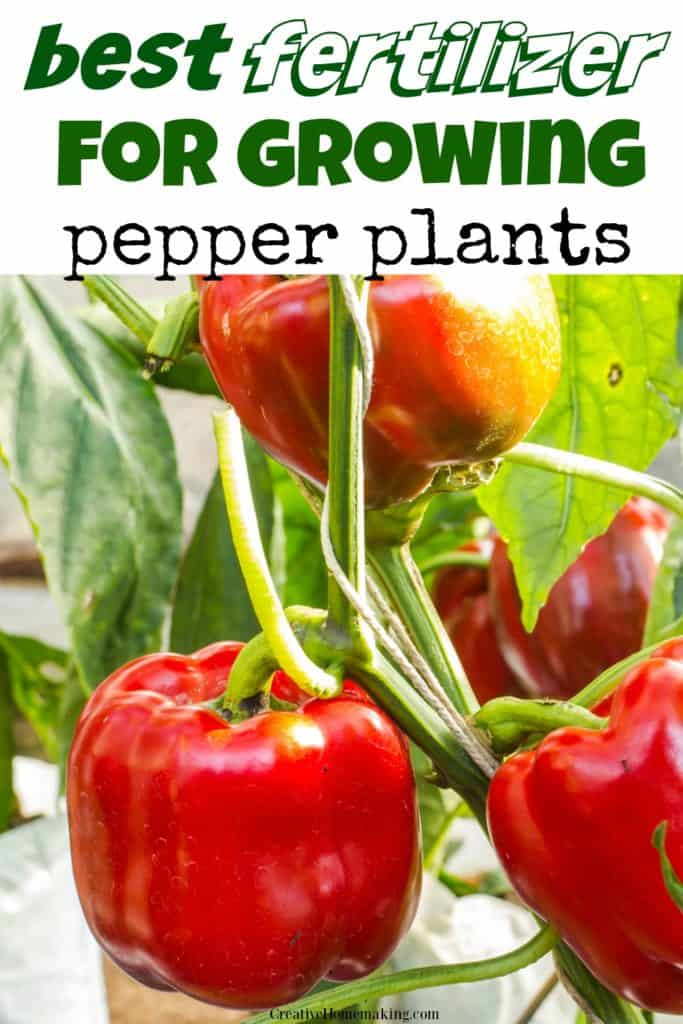Best Fertilizers for Peppers: Achieve Superior Results in Your Garden
Best Fertilizers for Peppers: Achieve Superior Results in Your Garden
Blog Article
Organic Vs. Synthetic Fertilizers: Which Is Best for Supporting Healthy And Balanced Pepper Plants?
In the world of nurturing healthy and balanced pepper plants, the choice in between synthetic and organic plant foods stands as a crucial choice with significant implications. While both options purpose to provide essential nutrients to support plant development, the subtleties of their influence on the dirt, plant health and wellness, and the atmosphere spark a debate that echoes throughout the gardening community. Understanding the unique advantages and possible risks of each fertilizer type is essential for pepper farmers looking for to enhance their returns while preserving a sustainable and eco-conscious strategy.
Benefits of Organic Plant Foods
Organic plant foods offer an environmentally-friendly and lasting method to nourishing pepper plants, giving crucial nutrients without making use of synthetic chemicals. These natural plant foods are obtained from organic sources such as garden compost, manure, bone dish, and seaweed, promoting dirt wellness and biodiversity. Unlike artificial fertilizers, organic alternatives release nutrients slowly, ensuring a constant and balanced supply for pepper plants to thrive.
One substantial benefit of organic fertilizers is their capacity to improve soil structure and water retention. By enhancing dirt wellness, natural fertilizers advertise helpful microbial task, which assists in nutrient uptake by pepper plants. Additionally, organic plant foods lower the risk of chemical run-off, securing water resources from air pollution and protecting the atmosphere.
In addition, natural fertilizers contribute to long-lasting dirt fertility by advertising the development of useful dirt microorganisms. These microorganisms help break down organic issue, launching nutrients in a form that is quickly obtainable to pepper plants. best fertilizers for peppers. By cultivating a healthy soil ecological community, natural fertilizers support sustainable pepper growing techniques that profit both plants and the environment
Disadvantages of Artificial Plant Foods
Synthetic fertilizers, in contrast to their organic counterparts, position various drawbacks when utilized to nourish pepper plants, affecting both plant health and environmental sustainability. One major downside of synthetic plant foods is their propensity to leach nutrients from the dirt promptly.
Additionally, the overuse of synthetic fertilizers can add to water air pollution. Excess plant foods not taken in by plants can get rid of into water bodies, leading to eutrophication, where algae blossoms diminish oxygen degrees in the water, hurting water life. Furthermore, synthetic plant foods are generally derived from non-renewable resources, such as fossil gas, adding to carbon discharges and environmental degradation throughout their manufacturing.
Nutrient Absorption Comparison
Efficient nutrient absorption plays a crucial role in the overall wellness and development of pepper plants. When comparing organic and artificial fertilizers in regards to nutrient absorption, natural fertilizers have the advantage of providing an extra well balanced and slow-release resource of nutrients (best fertilizers for peppers). Organic plant foods have a range of macro and trace elements that are not only advantageous for the plants yet likewise promote healthy and balanced dirt microbial task, which assists in nutrient uptake. On the various other hand, synthetic plant foods frequently offer a fast release of nutrients, which can bring about leaching and drainage, causing lower nutrient absorption rates by the plants.
Moreover, natural plant foods improve dirt structure and water go to website retention capability, permitting pepper plants to accessibility nutrients extra successfully. This better dirt top quality promotes origin advancement, making it possible for far better nutrient absorption. Artificial fertilizers, although at first increasing plant growth due to their high nutrient concentrations, might prevent long-term nutrient absorption by degrading soil wellness with time.
Ecological Influence Factors To Consider

On the various other hand, synthetic plant foods, although usually more instantly readily available and concentrated to plants, can have detrimental results on the environment otherwise applied appropriately (best fertilizers for peppers). Their production calls for high energy inputs, causing greenhouse gas emissions and adding to climate modification. The runoff of excess artificial fertilizers can infect water sources, leading to eutrophication and damaging water ecosystems.
Finest Plant Food Practices for Peppers
When fertilizing pepper plants, enhancing nutrient uptake and decreasing environmental effect are vital factors to consider. To achieve this, it is necessary to comply with ideal fertilizer methods customized to the specific needs of pepper plants. One vital technique is to execute a soil test before applying any fertilizers. This test can identify the pH level of the soil and determine any type of nutrient shortages, assisting you in picking one of the most ideal plant food solution.
Another important practice is to feed pepper plants at the appropriate time. Typically, peppers gain from obtaining plant food at planting and after that once again when they start to flower. Over-fertilizing can result in nutrition discrepancies and hurt the plants, so it is important to follow recommended application rates.
Additionally, choosing a well balanced plant food you can look here with an NPK proportion that matches pepper plants' demands is fundamental. Inevitably, integrating synthetic and natural fertilizers sensibly can help support healthy and balanced pepper plants while lessening ecological impact.
Final Thought
:strip_icc()/BHG-Growing-Peppers-Indoors-EzgaEnB7KML9Ym_plkvuxK-9398f1341d86483083862533ae7622db.jpg)
Organic fertilizers use an environmentally-friendly and sustainable strategy to nourishing pepper plants, supplying essential nutrients without the use of artificial chemicals. Unlike artificial fertilizers, natural alternatives release nutrients gradually, making this hyperlink certain a well balanced and steady supply for pepper plants to prosper.
Artificial plant foods, in contrast to their organic equivalents, posture various downsides when made use of to nourish pepper plants, affecting both plant wellness and ecological sustainability. When comparing organic and synthetic fertilizers in terms of nutrient absorption, organic fertilizers have the advantage of giving a more balanced and slow-release source of nutrients.Additionally, natural plant foods boost dirt framework and water retention ability, permitting pepper plants to access nutrients much more effectively.
Report this page